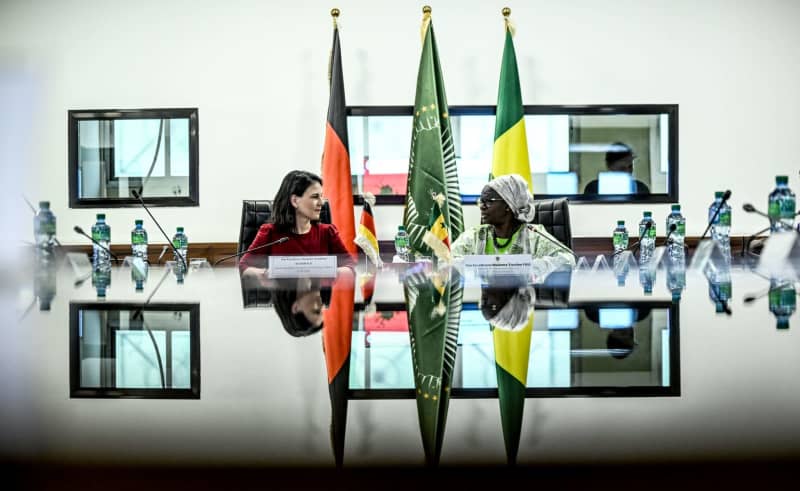German Foreign Minister Annalena Baerbock arrived in Senegal on Monday in an effort to intensify cooperation with West Africa’s democracies in order to keep at bay the instability currently seen in the Sahel countries.
“Security here in the region, the future prospects of this region, are also closely linked to our own security and our own development,” Baerbock said in Dakar.
“The problems and challenges of the region, terror, migration, organized crime and poverty also directly affect us in Europe,” said the minister, who is also planning to visit Ivory Coast, another of West Africa’s few remaining democracies.
Senegal and Ivory Coast are considered two of the most important partners for Europe at a time when more and more Sahel nations are turning to Russia.
Baerbock’s trip comes amid a wave of instability in the Sahel region, which some observers have termed the Coup Belt, following military uprisings in Mali, Chad, Guinea, Sudan, Burkina Faso, Niger and Gabon since 2020.
While many of the new military governments have turned away from relations with the European Union, withdrawn from the Economic Community of West African States (ECOWAS) and canvassed support from Russian forces, Senegal and Ivory Coast have maintained their relations with the West.
Following talks with her Senegalese counterpart Yassine Fall on Monday, Baerbock said she had no illusions about the unstable situation in the Sahel.
The putschists in Mali, Niger and Burkina Faso had set their countries back economically, politically and also in their relations with Germany, she said.
“We cannot simply carry on as if nothing had happened,” the minister stressed.
At the same time, it was also clear that the Sahel is part of Germany’s and Europe’s immediate neighbourhood, Baerbock said. “That is why we are not pulling down all our tents, but acting pragmatically within the remaining room for manoeuvre,” she said.
“With all the crises that are currently keeping us on tenterhooks, we know that Europe’s opportunities and challenges are inextricably linked to those of Africa.”
Baerbock’s two-day visit
While Germany’s top diplomat is touring West Africa, German Development Minister Svenja Schulze is hosting a meeting of the Sahel Alliance in Berlin, which coordinates international development cooperation for Mauritania, Mali, Burkina Faso, Niger and Chad.
Following the World Bank, France and the EU, Germany is the largest donor.
During her visit to Senegal, Baerbock also held talks with newly elected President Bassirou Diomaye Faye, considered a key figure for maintaining stability in the region.
Senegal has not experienced a violent conflict since its independence from France in 1960.
“The Senegalese have succeeded in initiating political change within the democratic system for all to see,” said Baerbock. “Wherever we as democracies, wherever we as Europe do not invest, others invest and create dependencies that, in case of doubt, are used against us and our security interests.” It was no coincidence, she said, that China and Russia in particular were making very large investments on the African continent.
Baerbock tours Dakar bus grid
Earlier, Baerbock began her two-day trip to West Africa with a tour of an electric express bus project in Dakar.
Dakar’s Bus Rapid Transit (BRT) system went into operation in May, with financing from the European Investment Bank and the World Bank. Along with the TER suburban train, the transport network aims to facilitate mobility and reduce environmental damage.
The population of the greater Dakar area has increased tenfold since 1970, with around 4 million people officially living in the region. Although the city lies on a peninsula by the sea, it suffers some of the worst air quality on the African continent.
Germany is committed to “proposals that benefit people on both sides today and tackle future challenges together,” said Baerbock, arguing that the project would advance Senegal’s green transition and improve residents’ quality of life.
She said that Africa’s first electric express bus system is a tangible example of beneficial cooperation, singling out the European Union’s Global Gateway initiative – which aims to invest up to €300 billion ($326 billion) in developing countries by 2027 – for praise.
Senegal, which began oil production a month ago and is aiming to start exporting natural gas by the end of the year, is simultaneously making increased efforts for a sustainable power supply.
According to the International Energy Agency, the country has met its wind and solar power targets set for 2025, which are now supplying a fifth of its electricity. The share of electricity from renewable energy is due to reach 40% by 2030.
To help Senegal reach its targets, €2.5 billion in public and private funds are to be mobilized under the Just Energy Transition Partnership with Germany, France, and the EU.
Annalena Baerbock, Germany’s Foreign Minister, talks to the Senegalese Minister for Infrastructure, Malick Ndiaye (R). The trip focuses on efforts to stabilize the Sahel region. Britta Pedersen/dpa
Annalena Baerbock, Germany’s Foreign Minister, rides on a bus during a visit to the Bus Rapid Transit (BRT) local transport system. The trip focuses on efforts to stabilize the Sahel region. Britta Pedersen/dpa
Source link : https://www.yahoo.com/news/germany-eyes-cooperation-w-africa-005204858.html
Author :
Publish date : 2024-07-16 00:52:00
Copyright for syndicated content belongs to the linked Source.
